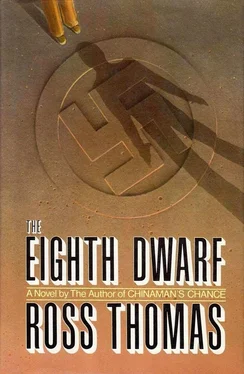Ulescu looked first at Jackson and then at Ploscaru. The dwarf examined Jackson for a moment, then smiled slightly, shrugged again, and said, “As he says, the bicycle stays.”
Ulescu gave the Poles the news and, before they could argue, waved them away with a big hand.
Jackson turned back to Bodden. He took the cigarettes from his pocket and tossed them down to the injured man, who nodded his thanks.
“Your compassion might get you into trouble someday, Mr. Jackson.”
Jackson grinned. “Don’t count on it, friend.”
“No,” Bodden said, “I won’t.”
Ploscaru walked over to the remaining footlocker, opened its lid again, and looked inside as though studying the contents. Finally, he reached in and brought out the .38 pistol. He checked to see that it was loaded and walked over to where Jackson stood. In his right hand he still held the .45 automatic. The dwarf stared for several moments at Bodden, then handed the .38 pistol to Jackson.
“If we don’t kill him,” Ploscaru said, “we’ll be making a mistake.”
“We don’t kill him,” Jackson said.
“All right,” the dwarf said, turned, and walked away.
So, printer, you live a while longer, Bodden thought, and looked up at the American. “ Auf Wiedersehen, Mr. Jackson.”
Jackson nodded. “ Auf Wiedersehen, friend.”
The 1946 Ford sedan that was parked in front of the big house near the Frankfurt zoo was olive drab in color and had a white star and U.S. Army markings. It also had wooden bumpers, because there had still been a shortage of chrome steel when it was manufactured in January of that year. Behind the sedan’s wheel was a bored Army corporal. Next to him was Lt. LaFollette Meyer.
The Corporal, a car lover, perked up a little when the big Mercedes roadster turned into the driveway. Lieutenant Meyer got out of the sedan and leaned against its front fender. He stared curiously at the dwarf who followed Jackson down the drive.
“We have to talk,” Lieutenant Meyer said when Jackson drew near.
Jackson nodded. “I don’t think you’ve met—”
Lieutenant Meyer interrupted. “I talk to you; not to him.”
Ploscaru stared up at Meyer for a moment, smiled slightly, shrugged, and turned away, heading for the big house.
“Let’s walk,” Meyer said.
“All right,” Jackson said, and fell in beside him.
“I’m trying to make up my mind about something,” Lieutenant Meyer said.
“What?”
“About whether I’m a Zionist or not”
“Which way are you leaning?”
Meyer seemed to think about it for a few moments. “I’m not sure,” he said finally. “In a way, if the Zionists have their way it will mean he won.”
“Who?”
“Hitler.”
“Oh.”
“At one time, you know, he was thinking of shipping all the Jews to Madagascar. And at one time the British offered them Kenya. Kenya, from what I hear wouldn’t have been at all bad. Good land, good climate. But it wasn’t Palestine. Or Israel. You know what I think Palestine could wind up being?”
“What?”
“The world’s largest ghetto.”
“The Jews will have to get rid of the British first,” Jackson said. “Then they will have to get rid of the Palestinians. If they keep the pressure on, the British will probably pull out. They’re broke. They’re going to be pulling out of a lot of places in the next few years. But the Palestinians haven’t got anyplace to pull out to. The Jews are going to have to fight them.”
“And the Syrians and the Egyptians and the Lebanese and probably the Transjordanians.”
“Probably,” Jackson said.
“I wonder if they could win.”
“The Jews?”
“Yeah.”
Jackson thought about it. “It probably depends upon which way Russia leans. The Zionist lobby is pretty strong in the States, so Washington will probably tilt that way. Which way Russia will go is anybody’s guess.”
Lieutenant Meyer nodded, and they walked on in silence for a moment. Then Meyer said, “Remember that buck general I told you about?”
Jackson nodded. “The one you said wasn’t very bright?”
“Yeah. General Grubbs. Knocker Grubbs. Well, the Knocker’s out and an old friend of yours is in.”
“Who?”
“They brought him up from Munich. They say he’s brilliant. I don’t know, maybe he is. I’ve only talked to him once, and that was this morning. He speaks German, though, and that’s a change. He went to Heidelberg before the war. The Army sent him.”
“Has he got a name, this old friend of mine?”
“Sorry, I thought I’d already mentioned it. Bookbinder. Samuel Bookbinder. He’s Jew, like me. Maybe that’s why he’s still only a colonel.”
“He’s no old friend of mine.”
“You know him, though.”
“We met a couple of times in Italy during the war. That doesn’t make us old friends.”
“Well, maybe he’s an old friend of some of your old friends — those ex-OSS wheels in Washington who think you need special handling. Anyway, the cables have been shooting back and forth between them and Bookbinder. You heard the latest about Oppenheimer?”
Jackson nodded. “I heard.”
“I thought you would. From his sister. Well, it’s a British show now.”
“In Bonn.”
“That’s right, in Bonn. They’re sending me up as liaison. You’re going, I suppose.”
“Yes.”
“Okay. First of all, there’s this.” Lieutenant Meyer took an envelope from his pocket and handed it to Jackson.
“What is it?”
“It’s a kind of laissez-passer, ” Lieutenant Meyer said — not doing too badly with the French phrase, Jackson thought. “It’s got a four-star general’s name signed to it. It should keep the British off your back unless you fuck up all over the place.”
“I’ll try not to,” Jackson said, and put the letter away without reading it.
“Okay, that’s one. Now here’s two, and two is the one I don’t much like, although the Army doesn’t care a hell of a lot what its first lieutenants like or don’t like. Except I don’t think this is the Army so much as it is your ex-OSS buddies in Washington.”
“Uh-huh,” Jackson said, because Meyer had paused as though expecting some comment.
“Bookbinder pretty much ran his own show down in Munich. He had to, because the Knocker was so fucking stupid. Well, Bookbinder has all sorts of lines out — to Berlin, to here, and even up to Hamburg where the British are. I don’t know where he got this; maybe it was from the British. But maybe not. Anyway, he’s learned that the Russians have sent someone in.”
“After Oppenheimer?”
“That’s right. He crossed over up north at a place called Lübeck. The British had a tag on him but it fell off, which didn’t make them too happy because they thought he might lead them to Oppenheimer.”
“Has he got a name?”
“No name. All that Bookbinder knows about him is that sometimes he’s called the Printer.”
“When’re you going to get to the part that you don’t like?”
“Now,” Lieutenant Meyer said. “The British don’t want Oppenheimer in Palestine. That means somebody else does, but I’m beginning to wonder who.” He looked searchingly at Jackson, but Jackson only shrugged.
“You got any ideas?” Meyer said.
“The Irgun is almost a sure bet.”
“Besides them?”
“The Russians.”
“What about us?”
Jackson stopped walking, turned, and stared at Meyer. After a long moment he said, “If the war were still going on, I’d say yes. It might be something tricky that the OSS would try to pull. Now, I don’t know. It’s a possibility, I suppose.”
Читать дальше












